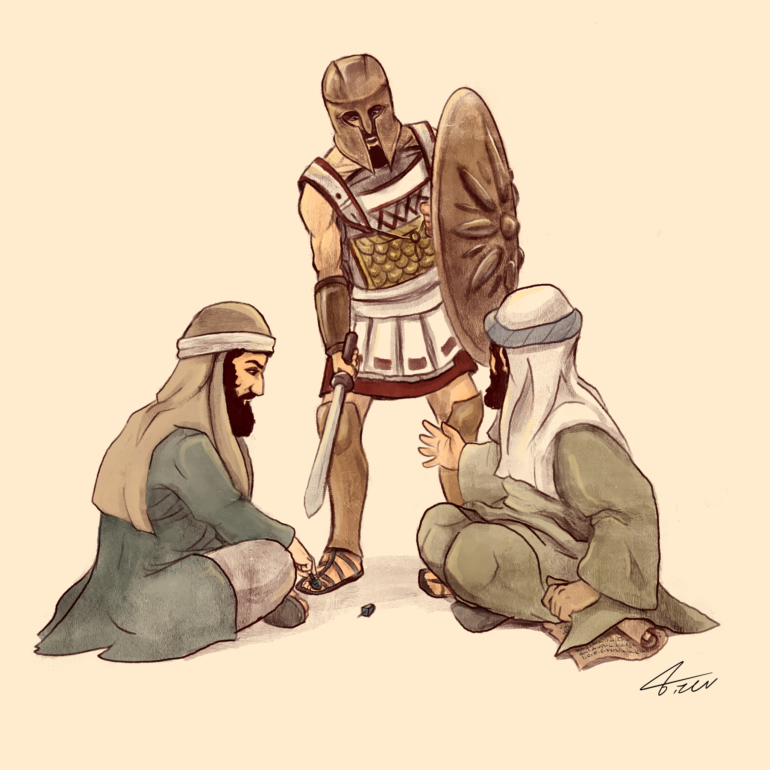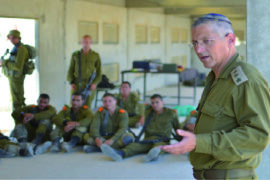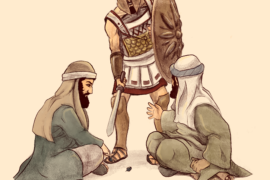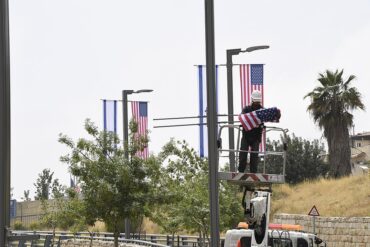The concluding episode of a podcast series on the first Book of Maccabees.
For more content from VISION Magazine, subscribe to our newsletter and follow us on Twitter @VISION_Mag_, Facebook and YouTube. If you haven’t already, don’t forget to subscribe to our podcast on SoundCloud, iTunes, Stitcher, TuneIn, or Spotify and leave a rating and review to help us get our message out to a wider audience!
To support the podcast, head over to our PayPal portal and be sure to write a note that your contribution is for the podcast.
Hosted by: Robert Goodman
Transcript:
Shalom Aleikhem! And welcome to the final installment in this series on Sefer Maccabim!
We’ve been on quite a journey together and I do hope that after listening to this series you have a better understanding of the events of the Maccabean Revolt, the motivations behind it, and its place as a part of the drama of Jewish history rather than treating it as an isolated incident.
In this final episode, I’d like to do a quick recap by running through the main events of the revolt, and then round off the series with a piece of Rambam.
So we start thirty four years after the building of the second Beit HaMikdash, when Alexander the Great conquers Judea from the Persians. But instead of destroying it, he peacefully absorbs Judea into his empire.
When Alexander dies, the empire splits into three entities. Judea is initially made part of the Ptolemaic Empire but later becomes part of the Seleucid Empire. The Seleucid emperor, Antiochus IV Epiphanes, is worried about maintaining control of the region, while simultaneously a number of Jews have become Hellenized by Greek culture and desire to force their fellow Jews into becoming Greeks.
These Jews approach Antiochus for help who willingly accepts their offer. They hand over the Temple treasury to Antiochus, who sets the reign of terror in motion – demanding the Olympian gods be worshipped, outlawing Shabbat, Rosh Ḥodesh and Brit Mila and killing all Jews who resist.
There are scattered pockets of resistance but it’s not until Miriam strips down at her wedding feast that a family of kohanim, the Ḥashmonayim, are catalyzed to fight back seriously.
When the Greeks turn up at their hometown of Modiin demanding they sacrifice a pig, Matityahu kills the Jew who tries to do it and leads a small band of rebels into the hills where they set up camp and organize a guerrilla war against the Seleucid Greeks.
Matityahu dies within a year, but his son Yehuda takes charge and becomes a legendary warrior. Using the tactics of luring the Greeks into the natural canyons and then striking from above, Yehuda leads his soldiers to a series of stunning victories at Maale Levona, Bet Ḥoron, Emmaus and Beit Tzur. After that last one, the Seleucid army retreats and Yehuda leads his people to Yerushalayim where they repair and purify the defiled Beit HaMikdash and kindle the Menora – which burns for eight days.
Following this victory and the establishment of the eight day holiday known as Ḥanukah, increasing anti-Semitism in the surrounding nations forces Yehuda to lead an expedition into the Gilad to free a group of trapped Jews living there, whom they bring back to Judea with them. Antiochus Epiphanes dies on a campaign into Persia to raise funds, and is succeeded by his son Antiochus V Eupator.
When some Hellenized Jews slander Yehuda to the new emperor, Antiochus sends under his general Lysias a large army and a herd of war elephants into Judea, whom the Maccabim confront at Beit Zakharia. After Elazar is crushed to death by the carcass of an elephant he slays, the Jews retreat to Yerushalayim and the Greeks besiege the city, finally lifting the siege on the 28th of Shvat – which is declared as a minor holiday.
Then Demetrius, cousin of Antiochus, escapes from Rome and makes his way to Antioch, where he usurps the Seleucid throne. Demetrius sends his general Bacchides to Judea, and Bacchides appoints his own Kohen Gadol, a Jew named Alcimus.
Alcimus is not quite as bad as the radically Hellenized Kohen Gadol Menelaus who preceded him, but he still wants Yehuda dead. He asks Demetrius for support, and Demetrius sends his general Nikanor to Judea; Nikanor becomes friends with Yehuda Maccabi and tries to convince him to lay down his arms.
When Demetrius scolds Nikanor for not doing his job, Nikanor turns against Yehuda and even threatens to destroy the Beit HaMikdash. This means war, but only Yehuda’s core group of followers answer the call – the Ḥassidim do not fight because they do not believe it is necessary to fight for the liberation of Eretz Yisrael.
That night Yehuda has a dream of Yirmiyahu the prophet handing him a golden sword and giving him the go-ahead to fight, and the next day, the 13the of Adar, they achieve a miraculous victory over Nikanor and his soldiers, assisted by the Jews from the surrounding villages who pour in to fight. The 13th of Adar is declared as a minor holiday too.
Yehuda sends ambassadors to the Romans to establish friendship between the two peoples, but they haven’t much chance to enjoy it before Demetrius sends another army against the Jews, who Yehuda goes up against at Elasa with just 800 men. Despite being outnumbered they fight their hardest, but they are overwhelmed and Yehuda is killed on the battlefield. His brothers bury his body in Modiin.
With Yehuda dead all his good work appears to unravel, as the Hellenized Jews begin hounding out his followers and handing them over to the Greeks, until only a handful are left free. Desperate, they appeal to Yehonatan to assume the mantle of leadership, and Yehonatan does so. When Bacchides corners them on the banks of the Jordan, Yehonatan beats them back, and then leads his small number of followers across the Jordan River into the desert, where they find and kill the bandits who murdered his brother Yoḥanan. After returning to Judea, Yehonatan outwits Bacchides yet again, eventually persuading the latter to leave Judea.
Enter Alexander Balas, contender for the Seleucid throne, who persuades Yehonatan to back him in his quest to unseat Demetrius. Alexander defeats Demetrius to become emperor, becomes the Egyptian Pharaoh’s son-in-law and treats Yehonatan with great respect and admiration, thus the Jews have a relatively peacefully existence for five years.
After that, Demetrius’s son Demetrius II comes from Crete and challenges Yehonatan to a battle not in the mountains, but on the plain, where “there is nowhere to flee to in defeat.”
Yehonatan comes down to the plain and even though he is initially surrounded with enemy soldiers, he keeps his cool and achieves a great victory, for which he is handsomely rewarded by Alexander Balas.
Ptolemy, the Egyptian Pharaoh, decides he doesn’t want Alexander as his son-in-law anymore and conspires with Demetrius to unseat him. They clash in a great battle in which Alexander loses, flees and is later beheaded, but Ptolemy is grievously injured and later succumbs to his injuries, leaving Demetrius as the sole Seleucid ruler.
Judea is still not fully independent from Greece, so Yehonatan tries using diplomacy to persuade Demetrius to remove the obstacles in the way of Judean independence, for instance, the taxes levied on Judea by Seleucid Greece and the bands of mercenaries still positioned up and down the country. He appears to make some progress when Demetrius agrees to release them from paying tribute.
Having no enemies left to fight, Demetrius dismisses most of his soldiers without pay, which is a mistake as it causes them to turn on him. Sensing this, Demetrius hires three thousand Jewish soldiers from Yehonatan and when the population of Antioch storm the emperor’s palace and attempt to lynch him, Demetrius’s life is saved by these Jewish soldiers who drive the people away by shooting from the rooftops.
Despite this, Demetrius stabs Yehonatan in the back by refusing to release them from tribute.
In a new development, the son of Alexander Balas is returned from Arabia by one of Alexander’s soldiers named Tryphon, and all of Demetrius’s soldiers defect over to him, forcing Demetrius to flee northwards to Turkey. But it doesn’t take long before he is marching on Judea again, and when Yonatan meets him by the Kinneret, Demetrius ambushes him with soldiers hidden in the nearby mountains, and all but fifty of Yehonatan’s soldiers run away. Despite this, Yehonatan still manages to turn back the enemy and win the battle.
Following this, Yehonatan renews the Jews’ friendships with the Romans and also the Lacedemonians of Sparta, and stops a retaliatory attack from Demetrius in its tracks by sending spies into the enemy camp. But then Tryphon decides he wants to be emperor instead of Antiochus and hatches a plan to get rid of Yehonatan. Tryphon lures Yehonatan into the walled city of Akko, then has the gates locked and takes him prisoner.
Shimon now steps up to lead the people and Tryphon offers to release Yehonatan in exchange for two of Yehonatan’s sons and a hundred talents of silver. But when Shimon pays up, Tryphon doesn’t release him. Tryphon, however is unable to gain a foothold in Judea. And eventually he decides to return to Antioch, but first he murders Yehonatan and Shimon has his body returned to Modiin. Shimon then has a magnificent monument built at his brothers’ gravesite. Shimon finally manages to convince Demetrius to remove the last remaining Seleucid taxes from Judea and on the 18th of Elul the war is won.
Shimon also leads the people in demolishing the Acra, which falls into their hands on the 23rd of Iyar.
Shimon rules the people for eight years, which are a golden age of peace for Judea. In Antioch, Tryphon is defeated by Antiochus VII, brother of Demetrius, and flees to the port city of Dora. Antiochus asks Shimon for assistance with the siege, but then turns nasty and demands that Shimon return the lands “unlawfully captured” from Seleucid Greece. Shimon firmly replies that the Jews have stolen nothing, but have returned to their rightful inheritance which they were unfairly displaced from several hundred years before.
Antiochus tries to fight Shimon, but when that fails, he convinces Shimon’s power hungry son-in-law Ptolemy to assassinate Shimon at a banquet. Ptolemy does so, and Shimon is killed, and succeeded by his son Yoḥanan Hyrcanus. And then, as we covered in the Aftermath episode, things goes downhill very fast.
So one might ask, why are we even celebrating on Ḥanukah? If everything went so horribly wrong then why bother celebrating? I’d like to try and answer, and with this I hope to conclude the series, by relating something I heard from Rabbi Menaḥem Listman, a teacher in Yeshivat Machon Meir in Yerushalayim.
In Mishne Torah (the section on Ḥanukah), the Rambam gives a historical background to Ḥanukah:
“During the period of the second Temple, when the Greek kings were in power, they proclaimed decrees against the Jewish people, abrogating their religion and forbidding them to study the Torah or to perform the divine precepts. They laid their hands on their wealth and their daughters; they entered the Temple and broke through it, defiling the things that were pure. The people of Israel were sorely distressed by their enemies, who oppressed them ruthlessly until the God of our fathers took pity, saved and rescued them from the hands of the tyrants. The Ḥashmonai high priests won victories, defeating the Syrian Greeks and saving Israel from their power. They set up a king from among the priests and Israel’s kingdom was restored for a period of more than two centuries, until the destruction of the second Temple.” (Hilkhot Ḥanukah 3:1)
There is certainly more than one way to understand Ḥanukah and the Maccabean Revolt, but I feel this paragraph from Rambam sums up the approach I have been trying to present throughout this series.
On Ḥanukah, we celebrate independence day. We celebrate our victory over the Greeks at the battle of Beit Tzur, our liberation of Yerushalayim, rededication of the Beit HaMikdash, and as Rambam tells us, the reestablishment of a Hebrew kingdom. Did that kingdom flop terribly? Yes. Was this kingdom eventually destroyed? Yes. But despite this, there is value to Jewish independence in our land, because only through Jewish independence in our land can the world be elevated to its ideal state.
I want to thank all of you listeners for sticking with this series the entire way – a lot of work went into it and it’s truly amazing to see it through to its completion. I hope that by listening to it, you now possess a greater appreciation for the Ḥanukah story, both as to where it falls in context of our people’s history as a whole and a deeper understanding of the significance behind the events and how to view them in the broader context of the war.
I want to thank my teachers at the Vision movement for everything you taught me – without you I would never have dreamed of being able to produce something like this. I want to especially thank Rabbi Yehuda HaKohen for all the Torah which has truly changed my life and also for agreeing to upload this podcast onto Vision Magazine. And finally I want to thank HaShem, who makes all things possible.





